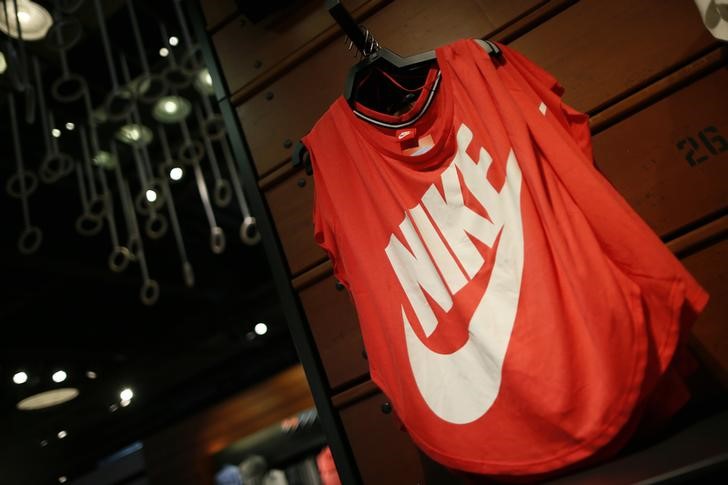Nike Inc (NYSE:NKE). held its annual meeting of shareholders on Tuesday, where several key proposals were put to a vote. The Oregon-based sports footwear manufacturer reported the results of this meeting in a recent SEC filing.
Shareholders voted on the election of directors, with all nominees for the Class A common stock being elected by a significant margin. Timothy Cook, John Donahoe II, Thasunda Duckett, Mónica Gil, Maria Henry, Peter Henry, Travis Knight, Mark Parker, and Michelle Peluso were re-elected, each receiving over 291 million votes in favor with approximately 5.65 million votes withheld.
For the Class B common stock, Cathleen Benko, John Rogers (NYSE:ROG), Jr., and Robert Swan were elected, with Benko and Swan receiving the majority of votes for and Rogers facing a notable number of withheld votes.
Additionally, the advisory vote on executive compensation was approved with nearly 950 million votes in favor, against approximately 190 million votes opposed, and 10 million abstentions. The appointment of PricewaterhouseCoopers LLP as the company's independent registered public accounting firm for the fiscal year ending May 31, 2025, was ratified with over 1.19 billion votes for, 72 million against, and 2.4 million abstentions.
Several shareholder proposals were also addressed. The proposal regarding supplemental pay equity disclosure was defeated, with over 842 million votes against and 296 million in favor. The proposal for a supply chain management report and one concerning worker-driven social responsibility were similarly rejected, with a vast majority voting against.
The proposal concerning environmental targets received over 302 million votes for, but was not passed due to the 832 million votes against. A proposal regarding a divisive partnerships congruency report was overwhelmingly defeated, with only 7.15 million votes in favor.
In other recent news, Nike Inc. experienced significant shifts in analyst ratings and strategic changes. Stifel reduced its price target for Nike from $88.00 to $79.00, citing increased competitive pressures in the U.S. market. Conversely, Williams Trading upgraded Nike's stock rating from Sell to Buy and raised the price target to $93.00, following the reinstatement of Tom Peddie as Vice President of Marketplace Partners. This leadership change has been well-received by Nike's wholesale partners.
Pershing Square (LON:PSHP) Capital Management, led by billionaire investor William Ackman, acquired approximately 3 million Nike shares, while Bernstein SocGen Group maintained an Outperform rating on Nike, observing improvements in the brand's performance metrics. Meanwhile, Citi reiterated its Buy rating on Nike despite concerns about sales in the Chinese market.
Piper Sandler initiated coverage on Nike with a Neutral rating, suggesting a potential multi-year reset for the company amid strategic shifts. These developments occurred alongside a significant workforce reduction at Nike, affecting less than 5% of its employees.
In a separate event, Nike shareholders rejected a proposal aimed at improving human rights conditions for supply chain workers in high-risk countries. Despite the rejection, Nike maintains its commitment to responsible business practices and ethical standards throughout its global operations.
InvestingPro Insights
In light of Nike Inc.'s recent shareholder meeting, it's insightful to consider the company's financial standing and market performance. According to InvestingPro data, Nike boasts a robust market capitalization of $118.48 billion, underscoring its significant presence in the industry. Despite a slight revenue growth of 0.28% over the last twelve months as of Q4 2024, the company maintains a high Price/Earnings (P/E) ratio of 20.99, indicating investor confidence in its future earnings potential. This is further supported by a solid gross profit margin of 44.68%, reflecting Nike's ability to manage production costs effectively and sustain profitability.
InvestingPro Tips highlight Nike's commitment to rewarding shareholders, as evidenced by a consecutive 22-year streak of raising dividends, and its ability to maintain dividend payments for an impressive 41 years. These factors, combined with the company's sound financial practices, such as ensuring cash flows can sufficiently cover interest payments and liquid assets surpassing short-term obligations, paint a picture of a financially stable enterprise. For investors seeking detailed analysis and additional insights, InvestingPro offers more tips on Nike, which can be found at InvestingPro.
This article was generated with the support of AI and reviewed by an editor. For more information see our T&C.
